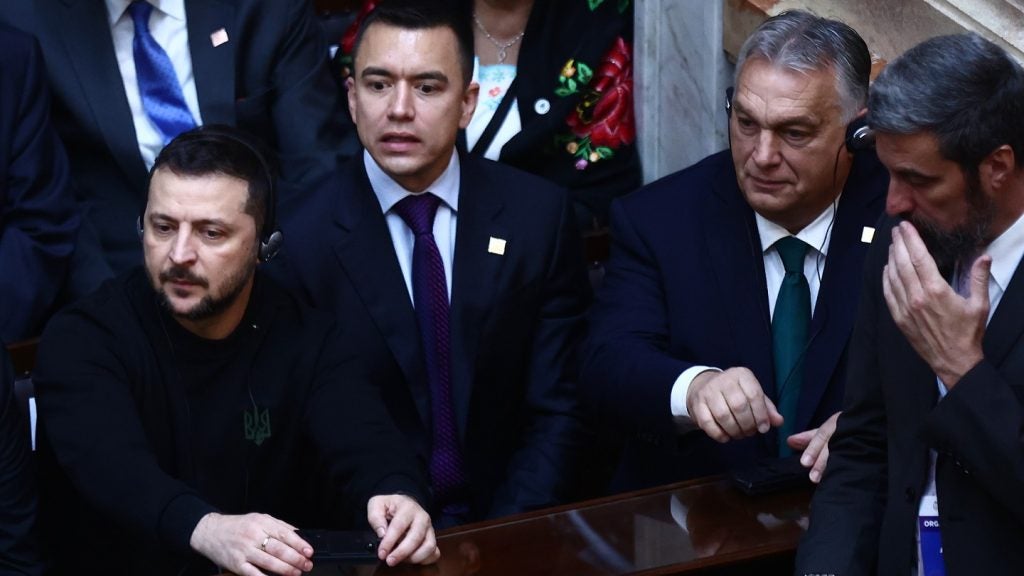Further doubt has been thrown over Ukraine’s accession to the EU after Hungary said it would not bow under mounting pressure to rubber-stamp Kyiv’s application during the bloc’s summit in Brussels on Thursday (14 December).
The ongoing dispute stole headlines during Argentinian President Javier Milei’s inauguration in Buenos Aires. Video footage emerged of a tense exchange between Ukrainian President Volodymyr Zelensky and Hungarian Prime Minister Viktor Orbán.
“It was as frank as possible and obviously it was about our European affairs,” Zelensky said in his nightly video address.
Kyiv-Budapest tensions
Orbán, who has close ties with Russian President Vladimir Putin, has repeatedly threatened to veto EU enlargement.
Last week, Orbán claimed Ukraine was “one of the most corrupt countries in the world”.
Membership negotiations cannot start until all EU members agree on a framework for the candidate country’s accession.
Ukraine’s Foreign Minister Dmytro Kuleba said there would be “devastating consequences” for his country and the EU if the talks are blocked.
Hungary remains the only serious critic of Ukraine’s EU ambitions.
Following the European Commission’s recommendation that formal negotiations on Ukraine’s accession should begin, Hungarian Foreign Minister Péter Szijjártó said Ukraine is “not suitable for EU membership”, claiming it would embroil the alliance in conflict.
A showdown in Brussels?
Szijjártó and Kuleba reportedly held cordial discussions in Brussels ahead of the EU summit.
Hungary’s hardball strategy is partly underpinned by Orbán’s ambition to unlock $30bn in funds which the EU withheld from Hungary last Tuesday (5 December).
The EU is expected to release $10bn of this after Budapest met the bloc’s demands to reform its judicial system – and perhaps as an incentive for Orbán to shift his position on Ukraine.
Enlargement aside, the EU agenda in Brussels will also include how to continue military aid for Ukraine – and a $50bn economic support package.
While Ukraine has increased defence spending, rising to approximately $44bn last year, Kyiv’s war effort is still heavily dependent on foreign aid.
Defence spending accounted for 3.5% of Ukraine’s GDP in 2023 and is expected to surpass 4% by 2025, according to GlobalData.
Zelensky has extended Ukraine’s diplomatic efforts far and wide as the conflict with Russia continues.
In Argentina, he used Milei’s inauguration to hold talks with leaders from Paraguay, Uruguay, and Ecuador, according to Ukraine’s Ministry of Defence, before appealing strongly for US military aid in Washington yesterday (11 December).
Our signals coverage is powered by GlobalData’s Thematic Engine, which tags millions of data items across six alternative datasets — patents, jobs, deals, company filings, social media mentions and news — to themes, sectors and companies. These signals enhance our predictive capabilities, helping us to identify the most disruptive threats across each of the sectors we cover and the companies best placed to succeed.









